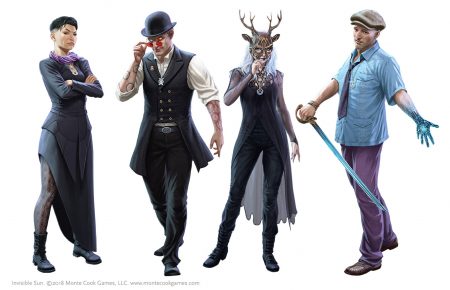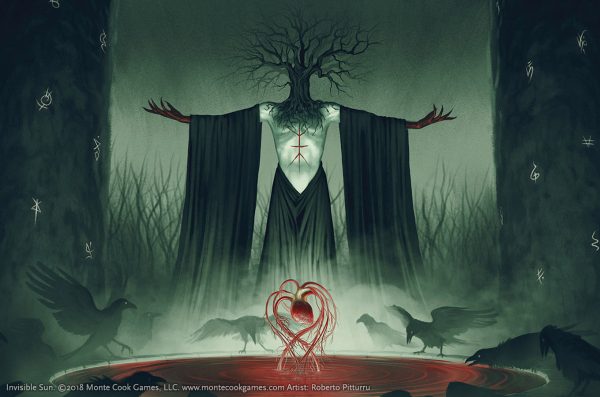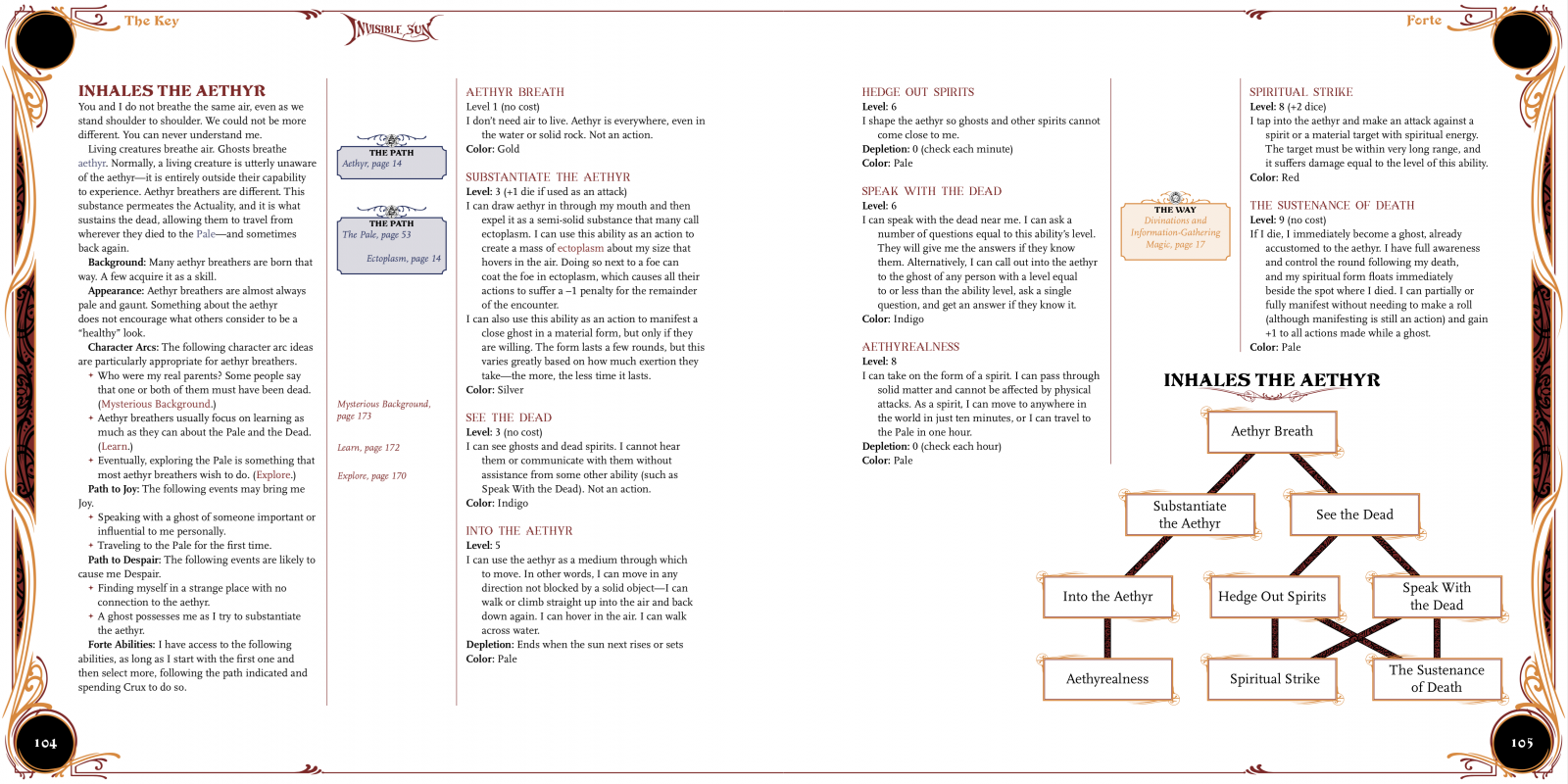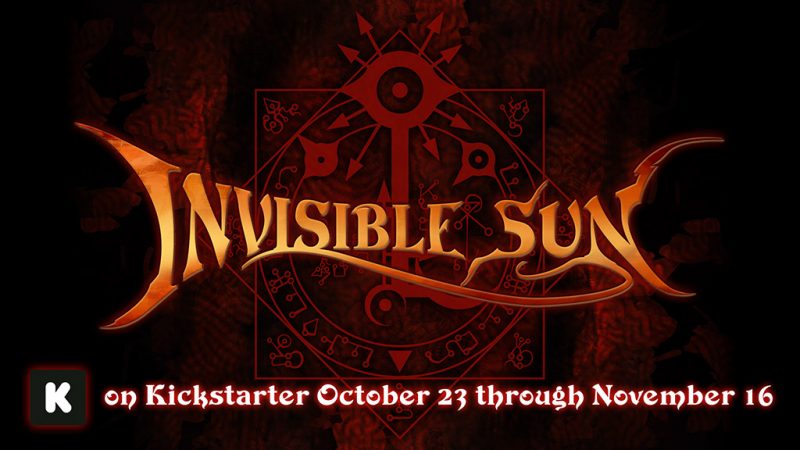Invisible Sun extracts you from Shadow–the mundane, magic-less world around us right now. You step into the Actuality–a land of surreal fantasy under the light of many suns–as a fully-fledged magic user called a vislae.
Vislae tend to lead interesting lives, delving into reality-bending secrets and traveling to mind-bending locales, but they’re also people, with unique relationships and desires and goals, both great and small. An Invisible Sun character is represented by a character sentence indicating four aspects arranged in a sentence like so:
I am a [FOUNDATION] [HEART] of the Order of [ORDER] who [FORTE].
Last week, we talked about the aspect of one’s order (the broad field or technique of magic that you wield), but there is far more to being a vislae than whether you are a Vance, Goetic, Maker, Weaver, or Apostate. You have an emotional nature (heart), a home and a connection to the people and goings-on around you (foundation), and a talent or focus that sets you apart from all other vislae (forte). Let’s dive in!
Heart
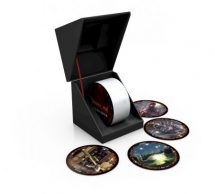
Heart is the very basis of your character. Order defines you, distinguishes you, but heart is your purest, truest self. It suggests your most basic nature.
Each heart is keyed to one of the classical elements, which is important because that means that each is keyed to one of the four families of cards in a Sooth Deck. Those families have associations far beyond just the four elements, so each heart also has an animal and an object. (These associations may not seem intuitive initially, but from the perspective of the entire setting, they make sense.) When a Sooth card of the character’s heart is turned in gameplay, that can sometimes have a specific effect for that character.
There are four heart types: Galant, Stoic, Empath, and Ardent. There are also names, antiquated and awkward to today’s ears and rarely used. Galants were once called Flamehearts. Stoics were Stonehearts. Empaths were Wavehearts, and Ardents were Stormhearts. Few modern vislae think in terms of the classical elements outside their Sooth Deck card family associations, and so only occasionally think of heart in these terms. Others drop the “heart” portion of each antiquated name, simply calling themselves a flame, a stone, a wave, or a storm.
- Galant (Flameheart): You are nimble in thought and deed. Quick thinking means you’re good on your feet, ready with an extemporaneous plan or action. You let your intuition be your guide more often than not, allowing you to be calm, even sanguine, in heated or stressful situations. Card family: Secrets. Animal: Raven. Object: Book.
- Stoic (Stoneheart):You are quiet and slow to action, but contemplative, even analytical. Rarely shaken. And you have great depths should anyone ever explore them. You rely on thought above sensation, emotion, or intuition. Sometimes you are said to have a phlegmatic temperament. Card family: Mysteries. Animal: Rat. Object: Mirror.
- Empath (Waveheart):You touch and are touched by the emotions and thoughts of those around you. Your words are wise and fall just right upon the ears of those who listen. You let your feelings serve as your guide. You are typically relaxed and peaceful. One might say you have a melancholic temperament. Card family: Visions. Animal: Swan. Object: Blade.
- Ardent (Stormheart):Quick to potent action, you react with strength and emotion, a veritable force of nature all on your own. At times, people might consider you short-tempered or even choleric in temperament. Your senses are what you trust. Card family: Notion. Animal: Cat. Object: Clock.
As a player, you may choose to use write the Heart aspect of your character sentence in the form of an adjective associated with your heart. For instance, an Empath character’s heart may be written as Empathic, Understanding, Gregarious, Nurturing, Compassionate, or Perceptive. Within the four hearts you may find great nuance of emotion and personality.
Forte
We’ve seen that heart is the innermost, basic essence of a vislae. However, there is yet another important component to each character. Forte reflects a talent or focus that is essentially unique to the character. It’s both what you do best and what you can do that most people can’t (or at least, not the way you do it).
Forte is the most active aspect of your character, so the names are always phrased as verbs like, “Travels as a Spirit,” “Revels in Beauty,” or “Fuses Nightmare to Fist.” Heart is who you are, order is where you belong, and forte is what you do.
A character’s forte is a suite of additional abilities they can learn to harness, arranged like a skill tree. Learning one ability might unlock the potential acquisition of one or two others later, and those in turn might provide access to others further down the tree.
A forte like Inhales the Aethyr (see the image below) enables a character to breathe aethyr, the medium that sustains spirits. After the starting ability Aethyr Breath, one has the option of choosing Substantiate the Aethyr or See the Dead next, and so on. You can also move back to a point where the path branched and make a choice you didn’t choose the first time. Thus, learning one ability unlocks the potential acquisition of another (or sometimes two) later, and the new ability in turn provides access to another farther along the tree. Typically, the farther you move down the path, the more potent the abilities become.
Foundation
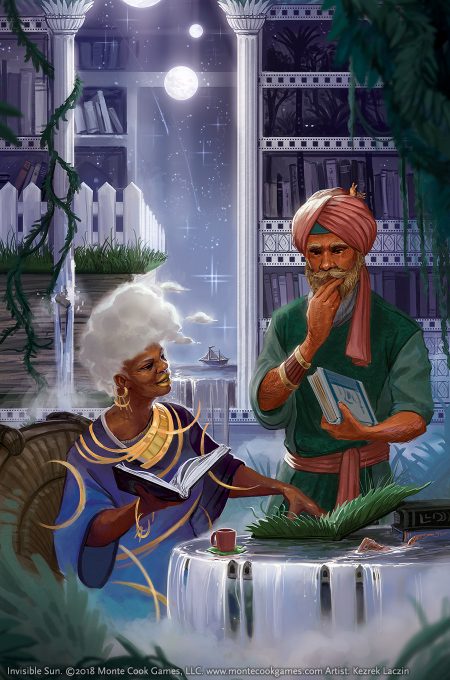
Perhaps appropriately, we come to the first word of the character statement last.
In the sentence “I am a [FOUNDATION] [HEART] of the order of [ORDER] who [FORTE],” foundation represents the character’s past, their relationships, their living situation, and their general circumstances. In Invisible Sun, none of these things are inconsequential character background, but instead are vital parts of the game.
Foundation names are adjectives such as Established, Connected, or Itinerant. Each sets forth a series of choices for the character that determine their financial situation (income and savings, if any), their home, their connections to various groups, and their bonds to specific individuals. And of course, foundations offer more story material for players to build upon to create arcs for their characters.
The Vislae House: It is a rare vislae who does not have a house. The vislae’s house is as integral to their being as their spells or stats. Such houses are often haunted, filled with mysterious unknown rooms, bigger on the inside, or possessed of their own intelligence. This is all determined in the character creation process.
Connections and Bonds: As important as skills, connections rate a character’s relationship with important general groups, like the high society of Satyrine or its art and theater crowd, as well as more specific groups like the order of Goetica, the Handasa, or the Church of Midnight. Bonds are more nuanced, as each character has strong and not-so-strong bonds with various people (either NPCs or PCs), and these bonds can offer benefits and drawbacks related to the strength of the bond and the status (and location) of the person the character is bonded to.
Completing Character Creation: Foundation is the finishing touch of character creation, and that’s why part of it extends into every campaign’s first session. Because through a fun subsystem, some of each character’s foundation—mainly the parts outside their control—is determined by the other players. Factors such as the vislae’s neighborhood and nearby locations, outside opinions and rumors about them, and the present effects of past relationships (good and bad, romantic and platonic) are all determined in a joint session of imagination and creativity. Of course, character creation doesn’t ever really end. Characters continue to develop, change, and grow. One of the focal points of the Invisible Sun game is the creation of deep, meaningful story arcs for all characters, as fantastic as any book you’ve read, or any film or show you’ve watched.
